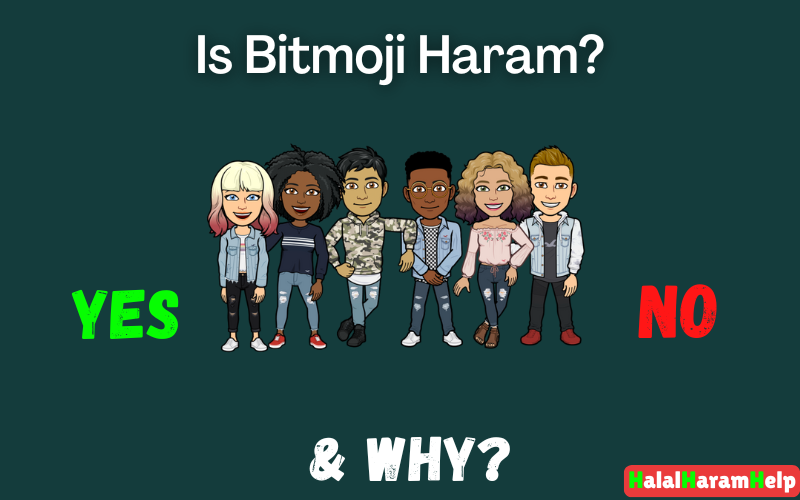Are you wondering whether creating or using a Bitmoji is permissible in Islam?
With the rise of digital expressions like avatars and emojis, questions about their compatibility with Islamic beliefs have become common.
In this article, we’ll explore whether Bitmojis are considered haram in Islam, delve into the reasons behind the ruling, and provide alternatives for those who wish to stay aligned with their faith.
Read on to make an informed decision about using Bitmojis in your digital interactions.

Is Bitmoji Haram In Islam?
Yes, Bitmojis can be considered haram in Islam, but it depends on how they are created or used.
If a Bitmoji depicts a complete human face with features like eyes, a nose, and ears, it is generally deemed haram based on Islamic teachings.
This is because creating images with full human features is seen as imitating Allah’s creation, which is prohibited in Islam.
However, if a Bitmoji is designed without complete facial features, such as missing a nose or ears, it may be considered halal.
This ruling stems from the prohibition in Islam of creating detailed representations of living beings, as it could lead to idolatry or an attempt to replicate divine creation.
Let’s explore the reasons behind this and examine the alternatives available for Muslims who wish to avoid any conflicts with their faith.
You might also like to know is Anime halal.
Why Are Bitmojis Haram?
Bitmojis with complete human features are considered haram for several reasons:
Imitating Creation: Islam forbids the creation of detailed images of living beings, as it is seen as challenging Allah’s power.
A hadith narrated by Hazrat Aisha (R.A.) quotes Prophet Muhammad (peace be upon him) as saying, “The makers of these images will be punished on the Day of Resurrection, and it will be said to them, ‘Give life to what you have created.’” (Sahih Muslim).
Risk of Idolatry: Detailed human-like images can lead to idol worship or self-obsession, which goes against the principles of Tawheed (the oneness of Allah).
Vanity and Modesty: Bitmojis often encourage self-expression, which might promote vanity or self-centeredness, traits discouraged in Islam.
Scholarly Opinions: While some scholars argue that Bitmojis are not real images and therefore permissible, others maintain a stricter interpretation, advising Muslims to avoid using them.
Are Emojis And Bitmojis The Same?
No, emojis and Bitmojis are not the same, and their rulings differ in Islam.
- Emojis: Simple, abstract symbols that represent emotions or objects. Since they do not resemble humans or animals closely, they are widely considered halal.
- Bitmojis: Personalized avatars that replicate human features. Bitmojis often resemble humans more closely, making them more likely to fall under the haram category if they depict complete facial features.
What Are the Consequences of Using Haram Bitmojis?
If Bitmojis with complete human features are considered haram, using or creating them may lead to:
- Spiritual Consequences: Displeasing Allah and possibly facing punishment in the afterlife for violating Islamic principles.
- Wasted Efforts: Spending time and energy on something not permissible in Islam could divert attention from more rewarding actions.
As Muslims, the goal is to align actions with Islamic teachings. If there is doubt about an activity being halal or haram, it is safer to avoid it.
Also see is home loan haram.
Alternatives To Bitmojis
For those who wish to express themselves digitally without compromising their faith, here are some alternatives:
- Islamic Avatars: Use apps or websites offering avatars that align with Islamic principles, such as ones depicting modest clothing and avoiding detailed facial features.
- Abstract Designs: Create simple, non-human representations like patterns, shapes, or symbols to convey your identity.
- Text Emojis: Stick to text-based emojis like 🙂 Or :D, which are entirely neutral and halal.
Balancing Digital Expression And Faith
The increasing popularity of digital avatars raises important questions for practicing Muslims.
While Bitmojis can be a fun way to interact online, they may conflict with Islamic teachings if they depict detailed human features.
By opting for permissible alternatives, Muslims can balance expressing themselves and staying true to their beliefs.
When in doubt, consult a trusted Islamic scholar to clarify and ensure your actions align with Islamic principles.
Conclusion
In conclusion, the permissibility of using Bitmojis in Islam depends on how they are created.
Bitmojis with complete human features are generally considered haram as they imitate Allah’s creation, which is prohibited in Islamic teachings.
However, simplified designs without full facial features may be permissible. For Muslims striving to adhere to their faith, it’s always best to avoid doubtful practices and opt for halal alternatives like Islamic avatars or abstract designs.
Remember, digital expression can still be meaningful while staying within the boundaries of Islamic values. When uncertain, seeking guidance from a scholar ensures clarity and peace of mind.


